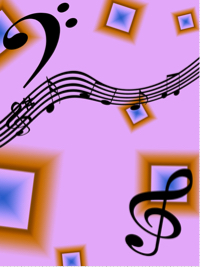Music Notation Is Not Music Theory


Are you a guitar player who is scared of learning theory because you think you have to learn how to read standard notation? Do you think that to make music it is necessary to learn how to read at all? Do you feel like an inferior musician because you cannot sight read every piece of music they put in front of you?
I actually do remember when I was a beginner that I was scared shitless of having to learn theory because that meant also learning to read music, and that looked very complicated. As it turns out I was exaggerating: reading music is not THAT complicate after all. But most important, I found that music notation and music theory are two completely different things, and you can study them separately or together.
That is, you CAN understand music theory without knowing how to read a single note.
What I just wrote is going to be obvious to half of you, and anathema to the other half. So let me explain.
Notation Is Not Bad...
First, let me state that learning notation is VERY useful to some musicians, especially (obviously) the ones that need to be able to sight read to do their job. So, many session musicians (especially in Jazz), and all orchestra pit musicians (not only classical musicians, but also the ones playing in Broadway shows for instance) are absolutely required to learn some form of notation.
But most rock, metal, punk, pop, and blues players can thrive without being the best sight readers in the room. Clearly, exceptions always exist.
Of course learning to read music is not as complicated as most people think (or they would like you to think) and there are many benefits in learning it, especially the rhythm notation part (hint: I have an eBook on music notations available for that purpose... but that's another story).
The real question is: "Is learning to read the BEST USE of my time and energy right now?" For some musicians and situations the answer is 'yes', and for others is 'not'. So keep reading to see if you need it.
...But It's Not Theory
Truth is, music notation has nearly nothing to do with music theory: it's just one of the possible languages used to communicate music, and so it is traditionally used to explain music theory. But there are many other ways to communicate a musical piece or an idea, and so the standard notation does not have the monopoly on theory.
While in practice some advanced concepts are explained exclusively using notation (say, if you want to learn strict counterpoint or orchestration you pretty much have to be able to read fluently), this is not true in general. Just to give you a couple of examples, chords, scales and modes can be explained without standard notation. Let's see a few details.
Chords
One can explain the whole theory of chord progressions without ever using standard notation.
Indeed, most of you know that the C major chord is made by the notes C E and G, and you may not know how these notes are written on the staff.
The same way, you may know that if you play a I vi ii V in C major, you are playing the chords C Am Dm G. Again, no need to refer to standard notation.
Even chord inversions are easy to explain in this way, and not only. You can go surprisingly far into how chords and chord progressions work without writing or reading a single note. Indeed this is what I do in my course on chords and progressions
Scales And Modes
It is perfectly possible to explain the complete theory of scales and modes on guitar without using any reference to standard notation. And yes I mean that this can be done without leaving anything unexplained. How is it possible? The most common way is to explain scales and modes directly on the guitar fretboard, but many other possibilities are available too.
In fact, to understand how modes really relate to each other it's better to leave the grand staff behind and rather think in terms of scale degrees (what modes have a major 3rd? What have a minor 3rd? and so on).
The same is true when it comes to comparing the harmonies (chords) that you can obtain from the different modes: in fact using standard notation can obscure the connections between modes rather than enlighten them!
Shameless plug: I am using these and other system in my Master of the Modes course to explain without any need to read Standard notation - though if you do like standard notation I have included it too.
Why Is This Important?
Incidentally this misconception also leads to another very common one: that many famous guitar players do not know anything about music theory. Indeed what many of them mean with "I don't know any theory" is that they do not know how to read music. But in fact they probably know their music theory really well (even if not formally) otherwise they wouldn't simply be able to write the music they do, or play the music they play.
What does all this have to do with you? The message here is quite simple: do not be scared of music theory, you can learn it without knowing how to read music. And if you are a beginner, here's a link on how to get started with music theory. Have fun!